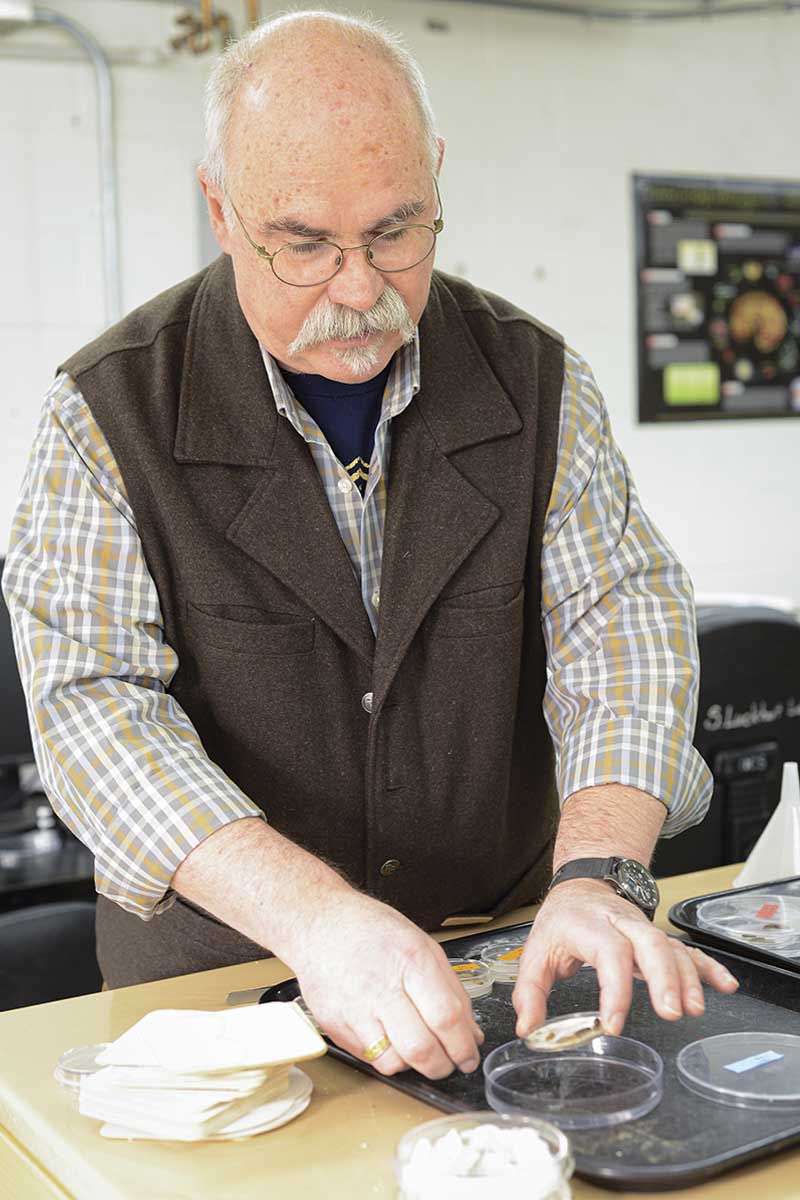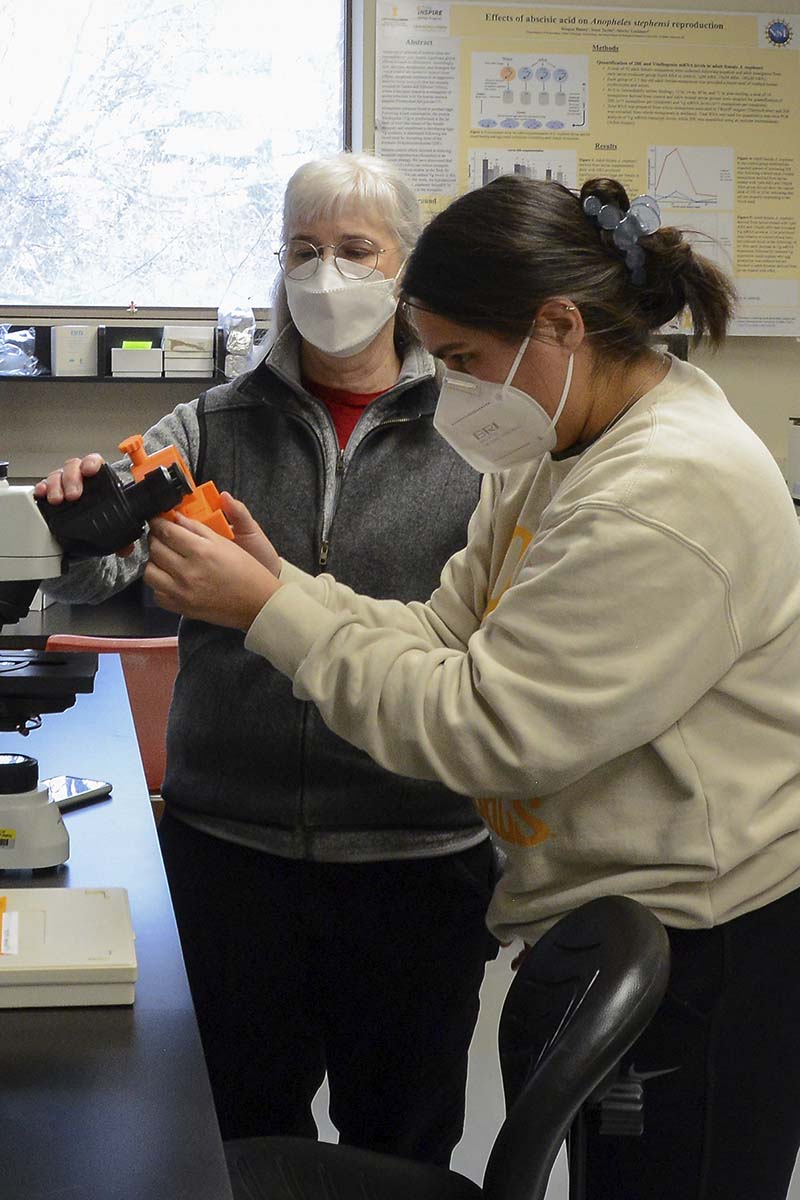Reaching Across Fields
Encouraging cross-disciplinary science with inspiration from Kenya
When Shirley Luckhart and her husband Edwin Lewis first visited Kenya as postdoctoral fellows 25 years ago, they almost stayed to make their lives there. But it’s a good thing they didn’t stay, because they have forged a far greater impact by teaching and connecting researchers across fields at the University of Idaho.
Over the past 25 years, Luckhart, a professor of entomology, plant pathology, nematology and biological sciences, has made regular visits to Kenya to study malaria. Each time, Luckhart and her colleagues drove west from Nairobi, along the escarpment and down into the timeless Rift Valley floor. Etched in her memory are pastoralists harvesting tea leaves, a black rhino that charged at their car, and pink flamingos on Lake Nakuru that looked like a pink blanket flying away. She speaks of it like home.
“It grabs your heart in a way that is so strange and so powerful and so unsettling that you feel like you need to be there,” she said.
Breaking Down Silos
As a graduate student and then as a postdoctoral scientist, Luckhart remembers conversations coming naturally with her colleagues about their wildly different research areas. But as she developed a specialized vocabulary for her discipline, she noticed these conversations didn’t come as easily. Her colleagues slowly withdrew into their own silos of expertise.
In countries with limited resources, this communication problem can be deadly.
“In Uganda, you go into the field and there’s a physician and then there’s an entomologist, and nobody’s talking to the other person. And you realize, we’re never going to solve these problems,” she said.
It was in this frustration that she and Lewis, a professor of entomology, plant pathology and nematology, identified a need to create an institute that would connect researchers across science fields. She hoped this institute would give researchers the tools to talk to each other.
The initial excitement eroded when she realized the difficulty of this ambition. For decades, Luckhart and Lewis talked about creating such an institute but made little progress. In academia, interacting with other fields can feel counter cultural. While studying insect pathogens at UC Davis, Lewis found that scientists stuck to their chosen discipline.
“If you don’t want to step out of your direct and focused field, you don’t have to. But at U of I, scientists are more used to it,” he said.
It’s this tendency to step out and interact with other researchers at U of I that appealed to Luckhart and Lewis.
“We just decided that if we were going to move again, we were going to make a big change,” said Luckhart.
In 2017, they moved to Moscow and founded the Center for Health in the Human Ecosystem, which became the Institute for Health in the Human Ecosystem (IHHE) in late 2021.
Communication From the Start
To encourage a diverse scientific outlook early in training, Luckhart, Lewis and colleagues created a major in global disease ecology at U of I which is administered by the Department of Entomology, Plant Pathology and Nematology. Research is central to this new major, and students develop their curriculum, write a research proposal, and perform research with a mentor.
Students are also encouraged to submit their proposals for funding opportunities, both on campus and off. In support of this ideal of undergraduate research, Luckhart, Lewis and colleague Glen Stevens garnered support from a USDA Research and Extension Experiences for Undergraduates grant in August 2021.
“I’m only here in this job because I was talked into joining a research project as an undergraduate. If I hadn’t done that, my life would be totally different,” said Lewis.
Actively participating in research changes the way students think about science. Each spring, the IHHE hosts a research symposium where students can practice communicating their research clearly. This is the seed of open science — providing a platform to make complex research accessible. This allows researchers to come up with solutions that they couldn’t have seen if they were isolated in their own field.
Overcoming the Language Barrier
As Luckhart and Lewis encourage students to conduct research and communicate, they’re anticipating the language barrier that more seasoned researchers face.
Every June the institute hosts an international course on the Biology of Vector-borne Diseases. The course focuses on diseases of plants, animals and humans to get scientists and trainees from these disparate groups talking to each other. The course brings instructors and participants from 25 countries together for six days on the U of I campus.
One of the challenges to overcome is differences in the languages of diverse scientific disciplines, which has encouraged the creation of dictionaries to help colleagues understand each other.
“I don’t know if there will be a next Kenya project,” said Luckhart.
But mentoring students, she says, is as fulfilling and impactful as tackling the parasite that infected over 260 million people and killed over 600,000 in 2021.
“Most of us trudge along and work really hard, and we produce research and publications of sometimes pretty good impact. But you start to realize that’s a small thing in the scope of the world,” she said.
Luckhart hopes to be a voice of reason for the next generation of students to think differently about how the world is changing around us. Luckhart and Lewis are changing how students study science to bridge the communication gap. In some ways, their impact might even extend back to Kenya someday as young researchers reach across fields to make a global impact.


Article by Kelsey Swenson, Institute for Interdisciplinary Data Sciences
Photos by Katy Lawler, Institute for Interdisciplinary Data Sciences
Published in February 2023








